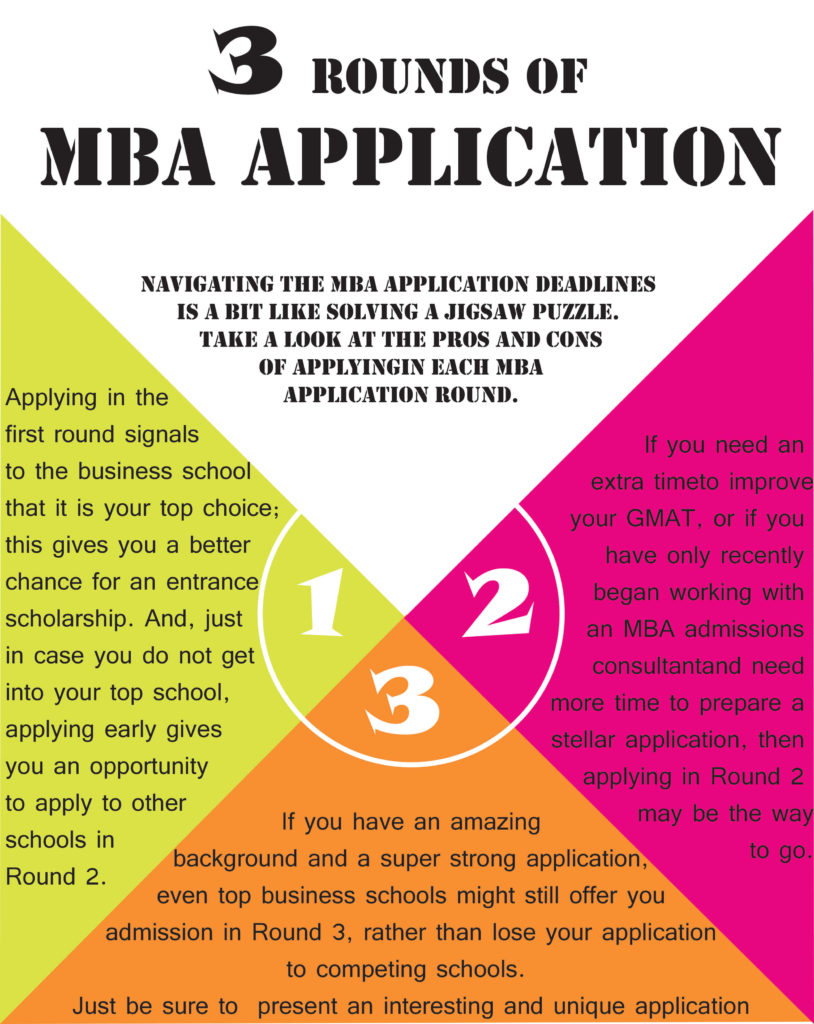
So, how do you decide when to submit your business school application? Do you have a better shot in round two rather than round one? Is there any sense in submitting in the final round? To answer these questions, we look at the pros and cons of applying in each MBA application round.
Round 1 (early in the year for rolling-based admissions)
Pros: Business schools view early applicants as serious and well-prepared candidates. Statistically, your chance of getting admitted early in the application cycle is higher, because you are only competing with applicants in that round.
Applying in the first round signals to the business school that it is your top choice; this gives you a better chance for an entrance scholarship. And, just in case you do not get into your top school, applying early gives you an opportunity to apply to other schools in Round 2.
Cons: If your application is not the strongest, a business school may decide to place you on a wait list and wait to see what other applications arrive later that year. If you could submit a better application in Round 2, it may be worth waiting.
Round 2 (mid-year for rolling-based admissions)
Pros: If you need a few extra weeks (or months) to improve your GMAT, or if you have only recently began working with an MBA admissions consultant and need more time to prepare a stellar application, then applying in Round 2 may be the way to go.
Applying later may also give you a chance to attend the schools’ information sessions, to visit the campuses, and to better tailor your application to each school.
Cons: Round 2 is when most applications arrive. You will be competing with a greater number of candidates (including those from the first round), so the Admissions Committee may be less willing to give consideration to your less-than-perfect application.
Round 3 (late in the year for rolling-based admissions)
Pros: Most business schools will still have a few spots available for outstanding candidates. If you have an amazing background and a super strong application, even top business schools might still offer you admission in Round 3, rather than lose your application to competing schools.
If you are applying to a second-tier school, it may have had a few spots opened up, because some of its accepted candidates decided to go to a different school. If you could present an interesting and unique application, you’d have a better chance of picking up the vacant spots late in the game.
Cons: The odds are not in your favour if you apply late. Most seats have already been filled. Most scholarships have been given out. If you are applying to top-ranked schools, you may be better off waiting a few months and applying in Round 1 of the following application year.
Yes, this may mean waiting another year to start your MBA, but – remember, that once you get your MBA, you won’t get a second chance in doing another MBA. Waiting a year and studying at a school that’s a much better choice for your career may be worth it in the long run.

What about applying to multiple schools?
The general advice we share with candidates is to apply to all their desired schools around the same time. However, if you do not have the time or resources to prepare all applications at once, consider splitting your school list into top choice and second choice schools, and apply to all of your top choice schools FIRST and in the same round.
Applying to schools with rolling admissions is even trickier, since if the AdCom considers your application very strong, it may make a decision very quickly and may give you a limited time to accept the offer and pay your deposit, especially if you’ve been offered an entrance scholarship.
Navigating application deadlines is a bit like solving a jigsaw puzzle. You will need to look not only at “Application Deadlines”, but also at the “Decision Release Dates” published by b-schools with round-based admissions, and decide on your timelines well before applying.
This article was first published by Admit Master, a premier full-service Test Preparation & Admissions Consulting Centre headquartered in Toronto.
Check out: How MBA Consulting Helps Business School Applications


Comments